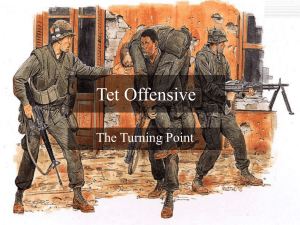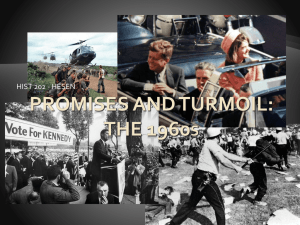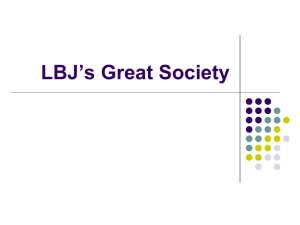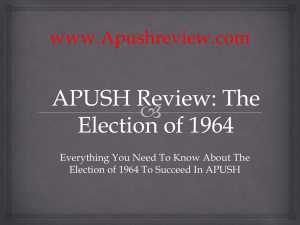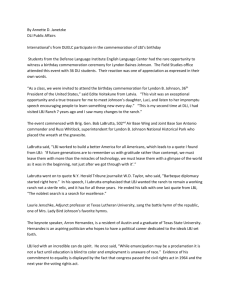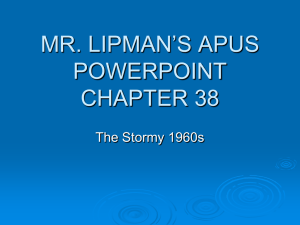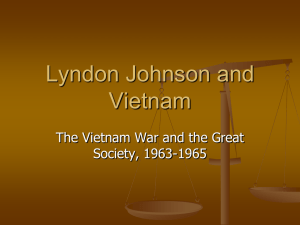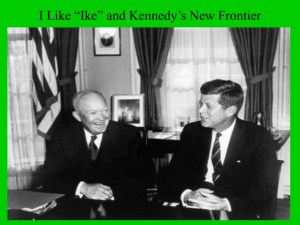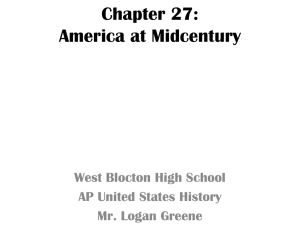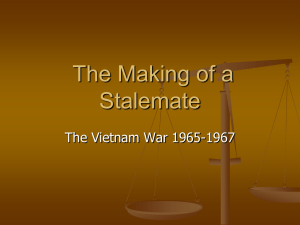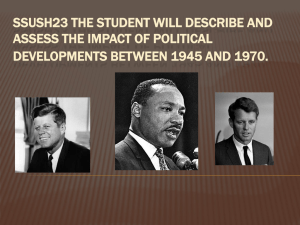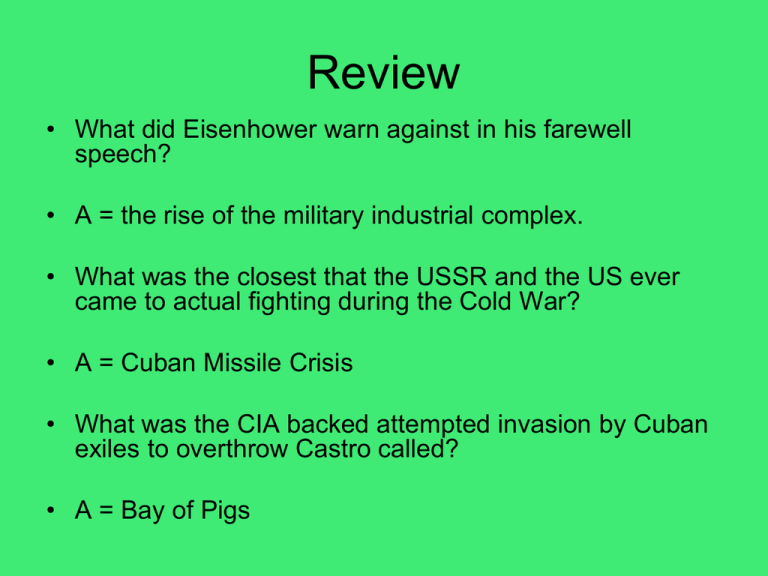
Review
• What did Eisenhower warn against in his farewell
speech?
• A = the rise of the military industrial complex.
• What was the closest that the USSR and the US ever
came to actual fighting during the Cold War?
• A = Cuban Missile Crisis
• What was the CIA backed attempted invasion by Cuban
exiles to overthrow Castro called?
• A = Bay of Pigs
Review
• Who were the group of writers and poets who wrote of
their disenchantment with middle-class conformity in the
1950s and 60s?
• A = Beats
• What was the “GI Bill”?
• A = Serviceman’s Readjustment Act. Gave $ to WWII
vets for college and housing.
• What was “GATT”?
• General Agreement on Tariffs and Trade—lowered tariffs
to encourage trade between nations.
Final Junk
• What is America’s space program called?
• A = NASA
• What year did America put a man on the moon and who
was he?
• A = 1969, Neil Armstrong
• What was Kennedy’s program to give lots of financial
aid to Latin America to help it develop and thus not turn
to communism?
• A = Alliance for Progress
It Never Ends
• What was the main obstacle that Kennedy had to
overcome as he ran for president In 1960?
• A = His religion (Catholic)
• Who was Kennedy’s opponent in the 1960 election?
• A = Richard Nixon
• What was the name of the program started by Kennedy
to send young people to developing (3rd world) countries
to help do things such as dig wells, build schools, etc.?
• A = Peace Corps
Last but not Least
• Why did the Kennedy presidency not
produce much in the way of substantial
domestic achievements?
LBJ and The Great Society
The High Point of American
Liberalism
LBJ Takes Over
• JFK is assassinated on November 22, 1963.
•
Warren Commission
• Government commission
headed by Supreme Court Chief
Justice Earl Warren to
investigate JFK assassination.
• Said that Lee Harvey Oswald
acted alone and killed Kennedy.
• Vice Pres. Lyndon Baines
Johnson takes over.
Who is LBJ?
• Lyndon Baines Johnson
• Politician—Congressman, Senator,
and V.P.—from Texas.
• Considered by many to have been
the most effective Senate majority
leader in U.S. history.
• Can be crude & has a big ego, but
driven and ambitious.
•
Many liberals don’t trust LBJ.
• Johnson’s personality
and being were great
contrasts to JFK.
• Believed that Govt. could
be used to improve
people’s lives.
• Thought that America had
such abundance that
there was no reason that
anybody should live in
poverty. He was an
optimist.
Johnson’s Ability to Get Laws
Passed
• Johnson was a much more skilled politician than
JFK.
• He took many plans that JFK could not get
through Congress and got them made into law.
• It was because of public support over the death
of Kennedy and LBJ’s skills.
• Also, a feeling amongst many people that the
country had the means to fix social inequality.
The Johnson Treatment
• Johnson would use
whatever means
necessary to
influence members of
Congress to vote his
way.
• His relentless, inyour-face method was
referred to as “The
Johnson Treatment.”
Michael Harrington’s The Other
America
• Book published in 1962.
• Claimed that despite great wealth,
approximately 25% of Americans still lived in
poverty.
• Claimed that there was a “culture of Poverty”
that was both a result and cause.
• Very influential to liberals in the 1960s.
The War On Poverty
• In 1964, Johnson institutes his “War on Poverty.”
• Did not want to create a permanent welfare
state, but rather, offer programs that could end
poverty and then be dissolved.
• Final bill includes among other things: Job
Corps, domestic peace corps [Volunteers in
Service to America (VISTA)], Community Action
Programs (CAP), and the creation of the Office
of Economic Opportunity (OEO).
LBJ Wins his own Term
• Election of 1964 = LBJ (Dem.) vs.
Barry Goldwater (Rep).
• Goldwater is perhaps the most
conservative Senator at the time.
• He claims, “Extremism in defense of
liberty is no vice…(and) moderation in
pursuit of justice is no virtue.
• Makes inflammatory remarks about
using nuclear weapons in Vietnam.
George Wallace
• Gov. of Alabama.
• Racist and populist—antiintellectual/elite.
• Southern demagogue who
actually garners support
outside of the South.
• “Segregation Now!
Segregation Tomorrow!
Segregation Forever!
• Showed the “beginnings of
white backlash.”
Johnson Wins in 1964
The Great Society
• After winning election in his own right, LBJ calls
for creating “The Great Society.”
• Great Society = LBJ’s domestic plan to fix
society.
• The most ambitious plan for government action
in a time of non-crisis.
• Is the pinnacle of American Liberalism.
Major Great Society Programs
• Medicare (1965) = Federal aid to the
elderly for medical expenses.
• Medicaid (1966) = Federal medical
assistance to welfare recipients and
other poor people of all ages.
• Head Start
• Food Stamps
• Immigration Act of 1965—ended
quotas, made it easier to immigrate to
the US.
Civil Rights Act of 1964
• Most comprehensive Civil Rights Bill since
Reconstruction.
• Banned racial discrimination in privately run
accommodations for the public—theatres,
restaurants, hotels, etc.
• Authorized the attorney general to eliminate
segregation in public places—schools, hospitals,
playgrounds, etc.
• Forbade discrimination in employment based on
race, color, religion, and sex.
Shortcomings of Civil Rights Act of
1964
• Nothing about voting rights.
• Nothing to alleviate the poor economic
condition of most blacks.
• Thus the law promoted legal, not social
equality.
Voting Rights Act of 1965
• Federal supervision of Voter
registration.
• Makes it so blacks in the South
can vote.
• Impact of Civil Rights Act &
Voting Rights Act are that
white’s in South start to abandon
the Democratic party and
become Republicans.
LBJ & Vietnam
• When LBJ takes over, America is already committed to
supporting South Vietnam both economically and
militarily.
• Johnson has great confidence in U.S. technological
superiority and thinks that “escalation” of the war will
defeat the primitive enemy.
• Gulf of Tonkin incident (1964)—Congress gives LBJ
unlimited authority to do what he wants in Vietnam.
Vietnam and the Downfall of LBJ
• LBJ’s escalation of the
Vietnam War proved to be
very divisive to U.S. society—
Hawks v. Doves.
• An anti-war movement began
to arise.
• The popular chant of
protesters became; “Hey, hey,
LBJ. How many kids did you
kill today?”
LBJ Review
• What was LBJ’s domestic plan called?
• A = The Great Society”
• A = What were some of the Great Society Programs?
• A = Medicare, Medicade, Head Start
• What did the Immigration Act of 1965 do?
• A = ended the quota system from the 1920s and made immigrating
to the US easier.
• Where did many white people move to after WII?
• A = the suburbs
More LBJ
• What were the 2 big pieces of civil rights legislation hat
were passed by LBJ during the mid 1960s?
• A = civil Rights Act of 1964 and the Voting Rights Act of
1965.
• How did the Vietnam war impact America at home
(domestically)?
• A = was very divisive (Hawks v. Doves)
• What factors made the 1960s so tumultuous?
• A = Civil Rights, Vietnam War, the emergence of the
Counter culture.
Last One
• What was it called when many older
middle-class whites became upset with the
turmoil of the 1960s and started to support
more conservative politicians?
• A = “White Backlash”
Riots
• “Long, Hot Summers” --Blacks riot in
various cities in the Summers of 1965,
1966, 1967.
• Biggest are in Watts (1965) & Detroit &
Newark (1967).
• More Riots after the assassination of MLK
on April 4, 1968.
Counter Culture
• “Hippies” People that reject traditional values (“the
establishment”).
• Long hair/different clothes
• Drug use (pot and LSD)
• Rejection of mainstream ideals of sexuality
(availability of birth control).
• Eastern religion and communes.
• Change in music
Impact of Counterculture
• Health Food Stores
• Fashion
• Music
Reasons for Counterculture
• Disillusionment
– A. Civil rights
– B. Vietnam
– C. Materialism of mainstream culture.
Blame elders for creating these problems.
Creates a “Generation Gap” –-Difference in attitudes
between generations.
The End for LBJ & American
Liberalism
•
•
•
•
•
Social Turmoil of the mid to late 1960’s causes “white backlash.”
Causes:
1. Vietnam war – Anti-war demonstrations.
2. Civil rights—Violence and riots.
3. Counterculture (hippies!)
•
To many whites (especially middle-class, blue collar), society seems to be unraveling
and they blame the party in power (and liberalism).
•
Also feel that they are being neglected—the minorities and women are getting the
attention.
•
White Backlash = middle-class whites begin rejecting liberalism and becoming more
conservative in their political and social outlooks.
•
This begins America’s move towards conservatism (particularly amongst blue collar
white men).
•
Cultural issues replace class issues.
Election of 1968
• Minnesota Senator Eugene McCarthy is anti-war candidate.
• “Be Clean for Gene”
• Comes in a close second in New Hampshire Primary.
• Robert Kennedy.
• Johnson decides not to run.
• Kennedy takes lead but is assassinated.
• VP Hubert Humphrey gets nomination & leads to massive protest at
Democratic convention in Chicago.
Democratic Convention—Chicago
1968
Nixon’s Comeback
• After losing to Kennedy in 1960, loses Cal. Gov.
race in 1962.
• “You won’t have Nixon to kick around anymore.”
• Remerges in 1968 claiming to represent the
“Silent Majority.” Says he will restore “law and
order.” Thus end the chaos of the 1960s.
• For Vietnam claims to have a secret plan to
achieve “peace with honor.”
Nixon Wins
• Republican Richard
Nixon wins the
Presidency.
• Segregationist
George Wallace wins
some Southern
States.
Definitions of Political Outlooks
• Liberals are people who think that the government can
be used to fix social problems.
• On social issues, liberals tend to be for legalized
abortions, for gun restrictions, for gay marriage, and
against prayer in school.
• Conservatives are people that think the government
interferes with personal freedom. Thus tend to be
against government programs.
• On social issues, conservatives are generally against
abortion, for gun ownership, against gay marriage, for
prayer in school.
Department of Housing and Urban
Development.
• LBJ appoints an African American—
Robert Weaver—as Dept. Secretary.
• 1st African American cabinet member.

